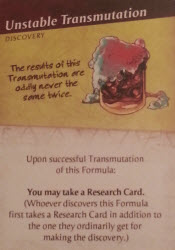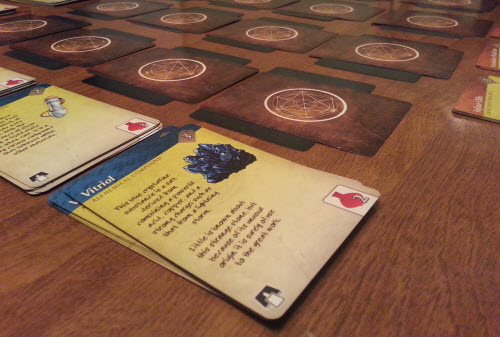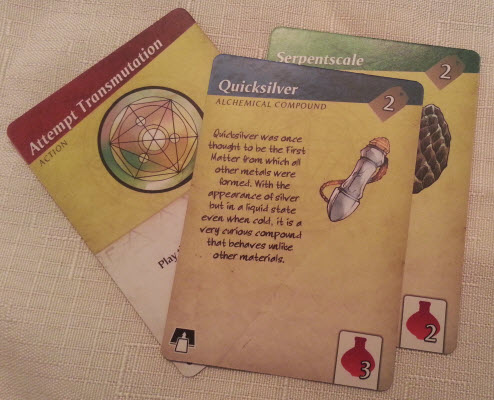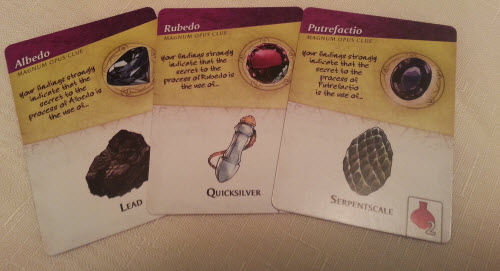To my dear friend Isaac,
I know not yet if word has reached you, but a most profound and prodigious discovery has been made in Arabia that has the potential to change everything. I have spent great energy and no small expense to bring this information as expediently as possible, for I fear that any skilled in the arts as yourself are bound to hear of this information before too long. My friend, your dreams of the great transformation may be possible. Jabir was wrong. Balinas was wrong! Scholars of great local renown have stumbled upon a new interpretation within the Emerald Tablet that could very well solve the theorms to which you have devoted your life. I have enclosed their findings. I wish you luck, and may your experiments bring you all that you seek.
– Silas N. F.
The Premise
The study of alchemy is not for the weak-spirited. Countless experiments have been attempted and come up empty, all in pursuit of unlocking the mystical properties of the unseen world and its ultimate reward: the Philosopher’s Stone. All previous attempts have failed, making it difficult to stay devoted (or even pay the rent.) Recent evidence, however, has been uncovered that will change all that. As alchemists, players compete against one another to become the first to create the Philosopher’s Stone and secure their place in history. The race is on!
The Rules
While Magnum Opus is fundamentally a deckbuilder, it won’t take a master alchemist to note that it doesn’t follow a standard formula. The majority of the game is focused on a central card grid, called the Discovery Matrix, and it takes some effort to set up the game’s 23 different card stacks. To start, a 4×4 grid is created by dealing 16 cards from the Research deck. Then 16 Discovery cards, including three Magnum Opus Clue cards, are dealt on top of them.
Next, eight Regent decks are placed, with four Mystical Components stacks along one axis and four Alchemical Compounds along the other. Four of each Reagent are then taken to form a Reagent Search deck. Lastly, the remaining stacks of Clue cards, Artifact cards, and Journeyman and Master Tradeskill cards are placed around the Discovery Matrix.
Players each receive a starting deck of Apprentice Tradeskill and Attempt Transmutation cards, an eight-sided die, and some gold. The starting player is chosen randomly.
Magnum Opus takes place in a series of turns, broken into four brief phases: Tradeskill, Table, Experimentation, and Pause & Consider. In Tradeskill, the player may discard up to one Tradeskill card for gold and / or up to one card to draw cards. Then, during the Table phase, players can pick up and / or place up to two Reagent or Artifact cards from their hand to their play area.
Next is the Experimentation phase. There are effectively four actions, but players may only take one. The first two are:
- Purchasing: Buy and / or sell up to two cards. Players may buy any available Reagents or Journeyman Tradeskills and sell any Reagents or Tradeskills from their hand.
- Draw a Reagent: Draw the top card of the Reagent Search deck.
The third choice is to Play an Action card, usually a Transmutation. Attempting Transmutations is the heart of Magnum Opus.
To Transmute, the player must have exactly one Alchemical Reagent and one Mystic Reagent on their table or in their hand; their table cannot have any Reagents not involved in the transmutation. Each Reagent has a Volatility number, and the player rolls to meet or exceed the combined Volatility of both Reagents. If successful, the resulting spot on the Discovery Matrix is revealed if it isn’t already. That player gains the stated effect. The first to discover a combination receives the underlying Research card as a reward.
If a player fails the roll, they gain an Experience marker, which can be spent on subsequent attempts to increase the die result.
Lastly, a busy alchemist may Pay an Assistant to reproduce an already discovered Transmutation by paying the gold cost of the two Reagents needed.
In the final Pause & Consider phase, the simply player discards and draws five new cards.
When a player successfully Transmutes into a Magnum Opus Clue, they draw its corresponding Clue card. Each Clue card depicts one of three ingredients needed to make the Philosopher’s Stone. Once the player has assembled them, they may try its three-Reagent Transformation. The first player to successfully do has created the Philosopher’s Stone and is the winner. They gain fame, money, power, and a name to live on for all time.
Everyone else should probably consider themselves lucky they didn’t burn the whole building down.
Navigating the Matrix

Our kind of alchemy
The pursuit of knowledge and discovery is quite often not a straight line. (Really, it’s more like a series of squiggly lines.) There are advances, setbacks, tangents, and dead ends. Some discoveries revolutionize the world, while most are quietly added to the lexicon of human understanding with little fanfare. Rare are groundbreaking experiments that behave precisely as expected and have results as desired. Sometimes when researching one thing, people stumble upon another discovery entirely.
Case in point: what do x-rays, microwave ovens, chocolate chip cookies, and penicillin all have in common?
They were all discovered by accident.
Magnum Opus captures that alchemical feeling of accidental discovery surprisingly well. Indeed, it does an admirable job of conveying its theme throughout the entire game. Tradeskill cards reflect the more mundane parts of experimentation, failing an experiment yields an experience marker to aid when trying again, and a player’s table space having to be clear of other items to properly carry out experiments are all small but fitting bits of flavor. This is all jelled together with the help of the game’s decent artwork.
However, the game best reflects its theme is via the Discovery Matrix.
Mechanically and thematically, the Discovery Matrix is inventive. Rather than simply having all of the game’s cards readily available from the beginning, everything starts in an unknown state. Only through players performing Transmutations are the cards revealed. This appropriately conveys that players are exploring unknown territory. You are literally yielding the secrets of your arcane craft as the game progresses, and the first person to unlock each is rewarded with some kind of tangible bonus. Daredevils will be particularly amused with this idea.

This card, in fact.
Even still, as admirable a job that Magnum Opus does with presenting its purpose, deckbuilders are always a challenge for theme-hungry Immersionists, and there still isn’t enough for them here.
However, while the use of the Discovery Matrix is straightforward, setup it takes more time than you’d expect for a light deckbuilder. This is only compounded further from a rulebook that contains a handful of typos that will confuse first-time players – plus omitting the fact that the Research deck is essentially only used by one specific Artifact. These rules vagaries are unfortunate as they also diminishes what is an otherwise decent walkthrough of the game.
Chancy Expectations
It’s evident almost immediately that Magnum Opus is a luck-based deckbuilder: not just from the normal luck of the draw, but also with how much of the game hinges on the transformation rolls.
Luck in this game is inescapable. One player could potentially find all three Clue discoveries on their first attempts, while another’s rolls won’t let them transmute earth and water into mud. Which Reagents required also play a large role, as some of them are easier to transmute than others.
More importantly, though, is that there aren’t many ways to mitigate the luck factor. Some Artifacts help reduce the target number, and while experience markers can be added to die results, you only get them from having already failed previously. Furthermore, using the Assistant action lets you avoid making most rolls, but only if it’s already been discovered and you have the cash. Like many great ventures, the odds may not be on your side.

No homunculi allowed.
The upshot to this is that you don’t have to be a master deckbuilding strategist to enjoy Magnum Opus. The game isn’t devoid of making decisions, but because much of what happens is at the whim of the dice, players always start out with an equal chance at winning, regardless of experience.
This is the type of deckbuilding game that Socializers enjoy, as turns are quick and the rules are simple. However, since there isn’t any in-game player interaction, players could lose interest over time if a game of Magnum Opus starts to drag due to, say, a table full of unlucky rollers.
Architects may be conflicted on this one. The premise of exploring the Discovery Matrix grid and seeing what items to make may be worthwhile, but at the same time they could back away since the game doesn’t really reward you for having a long-term strategy.
Strikers waver even less: they will not be excited about Magnum Opus. Mixing this group with a game whose outcomes are determined almost entirely by chance is like mixing oil and water. Magnum Opus evokes a ‘play to win’ mindset, but they won’t bother since the game relies so heavily on luck to get there.
A Two-Stroke Engine Builder
If you think of a deckbuilder as a vehicle, then how you manipulate the deck is your engine. Some deck engines are lumbering but powerful, while others are high octane affairs with series after series of crazy card combos, and it’s up to the player to decide what their best course is.

No room for reckless science.
With Magnum Opus that engine rarely gets beyond idling speed. The game tightly controls how much you are able to manipulate your deck on any given turn. For example, card draw is at best between one and four cards.
At the same time, Magnum Opus is very light on card culling; expunging cards from your deck is a slow and costly process. That is, you can sell Reagants back to get rid of them, but they never generate more than one gold. What’s more, while you can cull your starting Apprentice Tradeskill cards for no reward, there is no way to reduce your six Attempt Transmutation cards. The practical result is that you don’t get a ton of deck variation between players.
On the one hand, this makes it difficult for a player to churn through their deck. Magnum Opus severely curtails the ability for someone to spend several minutes playing their deck at everyone else. Turns are still a largely non-interactive affair, but the result keeps turns more grounded and manageable to follow. Apparently even for proto-scientists, alchemists were pretty methodical…

“Take it from us. Don’t rush alchemy.”
On the other hand, for many the chance to create a powerful deck engine is what drives the excitement of deckbuilders – Strikers and Tacticians particularly. For them, it’s a rewarding process finding the hidden card interactions on the board and leveraging those combinations into a winning strategy.
This explosive deck behavior isn’t readily possible with Magnum Opus. Rather, since the game already has a moderate degree of luck from the dice rolls, it aims to offset that randomness by keeping decks from getting too unpredictable. In some respects it’s a wise decision, as to avoid the game becoming even more luck-based and one-sided. But this also means that some will feel heavily handcuffed. Tacticians, this is not the deckbuilder for you.
The Takeaway
A magnum opus is a pinnacle achievement, so whether this game is deserving of the title remains to be seen. What is known is that Magnum Opus is an adequate lightweight casual deckbuilder with unique attributes. The Discovery Matrix is a particularly innovative way to build decks and give players a sense of thematic purpose at the same time. However, in exchange, the game trades many freedoms of deck construction and variety with a heavy dose of luck, and that will not resonate with everyone. Still, while Magnum Opus is unpredictable, uneven, and sometimes repetitive due to its randomness, it is an otherwise straightforward game that’s easily accessible to play. For those who like the idea of a luck-based deckbuilder, where everyone has an equal shot of fame and glory, then Magnum Opus may indeed have the right ingredients.
Magnum Opus is a product of Game Salute.
Cardboard Republic Snapshot Scoring (Based on scale of 5):
Artwork: 4
Rules Clarity: 3.5
Replay Value: 3
Physical Quality: 3.5
Overall Score: 3.5
Photo Credits: cookies by Brian Richardson; speed sign by Chad Elliot; Fullmetal by Wikia;



